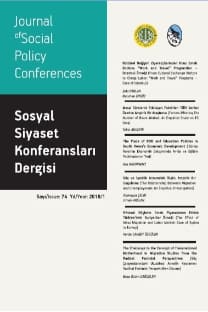The Welfare States and Happiness Inequalities in Europe
Income distribution is a widely used measure of inequality, but in the assessment of welfare it is deemed to be insufficient. When measuring inequality in the distribution of welfare, subjective evaluations such as happiness and life satisfaction should also be taken into account. The purpose of this study was to analyze happiness inequalities in different welfare states in Europe. Overall happiness inequality, as well as happiness inequalities between different socioeconomic groups in these countries , were explored. Furthermore, this study analyzed how these inequalities changed over time. The European Quality of Life Survey (EQLS) data set was used for the analysis. Independent sample t-test and one way ANOVA were also used. All analyses were done using the IBM SPSS 22 program. It was found that social democratic welfare states which consistently rank at the top of happiness rankings had the lowest overall happiness inequalities. Happiness inequalities among different sociodemographic population groups were also low in these countries. On the contrary, post-socialist welfare states had the highest happiness inequalities. Compared to employed people the unemployed were significantly unhappy in corporatist countries. Post-socialist and southern European welfare states stood out as having high happiness inequalities between those with good and poor health and between the young and elderly.
Keywords:
Happiness, inequality, welfare states, life satisfaction social policy,
___
- T. Ovaska and R. Takashima, "Does a Rising Tide Lift All the Boats? Explaining the National Inequality of Happiness," Journal of Economic Issues, vol. 44, no. 1, pp. 205-224, 2010.
- J. Stiglitz, A. Sen and J. Fitoussi, “Report by the commission on the measurement of economic performance and social progress,” Paris, 2009.
- The Happiness Research Institute, “Happiness Equality Index Europe 2015,” 2015.
- J. Helliwell, F. R. Layard and J. D. Sachs, “World Happiness Report,” 2016.
- G. Esping-Andersen, Three Worlds of Welfare Capitalism, Cambridge: Polity Press, 1990.
- D. Brady, Rich Democracies, Poor People: How Politics Explain Poverty, Oxford: Oxford University Press, 2009.
- M. Schröder, “Welfare States and their Inequality as a Result of Cultural Differences,” in Understanding Inequality: Social Costs and Benefits, Wiesbaden, Springer VS, 2016, pp. 39-67.
- ISSN: 1304-0103
- Yayın Aralığı: Yılda 2 Sayı
- Başlangıç: 1948
- Yayıncı: İstanbul Üniversitesi Yayınevi
Sayıdaki Diğer Makaleler
Eray TUĞRUL, Merve KOÇOĞLU SAZKAYA
Katılım Perspektifiyle Kadın Muhtarların Meslek ve Rol Algılarına İlişkin Keşifsel Bir Çalışma
Duru ŞAHYAR AKDEMİR, Aytül Ayşe CENGİZ
Çocuk Emeği Kullanımından Kaynaklanan Sosyal Hukuk Sorunları
OECD Ülkelerinde Güvenceli Esneklik: Konumlanma ve Sınıflandırma
